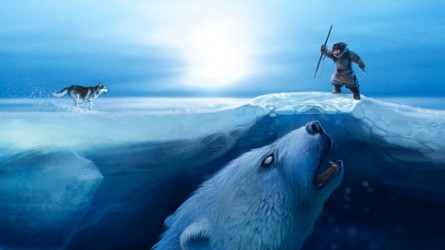Article Origin
Volume
Issue
Year
A media company in Nunavut is taking a modern approach to traditional stories and culture. Taqqut Productions Inc. is an Iqaluit-based, Inuit-owned film company dedicated to sharing stories from the north through voices of the north.
Created in 2011 by Louise Flaherty and Neil Christopher, Taqqut Productions has been creating animated children’s films, and winning international awards for their work.
“I am a grandmother, and growing up we had very limited books and resources that showed our identity,” said Flaherty. “So for my granddaughter’s generation, I wanted to make sure they had more of us in the books they would be reading, and also in what she was going to be watching.”
“She watches a lot of Treehouse, but it’s not in her language… I thought I would be able to contribute that way, if we started animating at least a few traditional stories,” she said.
A “taqqut” is a stick used to light a type of oil lamp called the Qulliq. It’s a suiting name for a company whose mandate is to educate youth, and whose main executives come from a background in teaching.
Flaherty and Christopher first teamed up because they shared the same concern; that most of the resources they used for teaching students were created by people who had little knowledge of northern life, little knowledge of traditional Inuit culture in the north, and no knowledge of the language of the north—Inuktitut.
“The first film we created was ‘Amaqqut Nunaat: The Country of Wolves’. It’s about a journey two brothers take... Of course hunting in the north is always risky, and the ice breaks off, and they’re floating in a sea of ice, and they come across a village of wolves…” said Flaherty, adding that in Inuit culture, animals are often given human qualities, like the ability to gather into a village.
“It’s about two brothers surviving… one dying and coming back to his wife. She takes his goggles off and discovers he’s actually dead... So it’s a bit creepy, but it’s a good little story,” she said, with a laugh.
That film landed invitations to the ImagiNative Film Festival, where it picked up two awards, and went on to travel internationally, winning more. The Taqqut team has made two other award-winning films since then, “The Amautalik”, and “The Orphan and the Polar Bear”, and have three in the works now—“Beyond the Inukshuk”, “The World Beyond the Inukshuk”, and the “Giant Bear” (Nanurluk in Inuktitut), which is just about to make its debut.
“We are still waiting for broadcaster commitments for Anaana’s Tent—Anaana means mother. If we get the support, that will be very good for the kids because it’s a series… like Sesame Street, only in Inuktitut. The children are learning letters, and there are guest speakers that are well-known Inuit performers,” said Flaherty.
The company, right now, has eight full-time staff, with many others who come and go, depending on the talent needed for each project, said Flaherty’s fellow producer, Christopher. For Christopher, being Inuit is not as important in the work as simply sharing stories that speak directly to long-time northerners.
“So far, we haven’t pitched anything that isn’t beneficial to our northern audience. Everything we do is available in English and Inuktitut… But if you look at our style, too, it doesn’t necessarily look like Indigenous art. We have modern artists up north that grew up on Marvel Comics and their art has been influenced by that,” he said.
"Sometimes we submit films to Indigenous film festivals, but at some point you just want it to be a short film. It doesn’t need to just be exposed to people going to Indigenous film festivals,” he added.
One of the real challenges he’s found has been in having the company’s productions taken seriously by the mainstream, and placed into the categories the stories were actually intended to be placed in.
When they first started out, they were Inhabit Media, specializing in book publishing only, and their books were often put in the Native Studies sections at bookstores, especially within the Indigo-Chapters chains.
“It’s also insulting on some level… It’s children’s literature, and it should be able to compete in children’s literature on any level... It took years of pushing to get them out of that spot,” he said.
Nadia Mike is an employee of both Taqqut and Inhabit Media. She is directing her first short film for the company now. It’s considered contemporary, because it’s not based on a tale that already exists in Inuit culture, but it still helps educate children living a traditional northern life.
“It’s about two arctic animals, and the plot of the story is making sure you are prepared when you go out on the land. One animal is so excited to go out on the land on their fishing trip, he forgets to check his snowmobile to see if it has any gas,” said Mike.
“It’s really important because up north, with climate change, there’s lots of accidents and people getting lost out on the land or ending up missing, because they’re just sometimes not prepared enough to go,” she said.
- 2402 views

